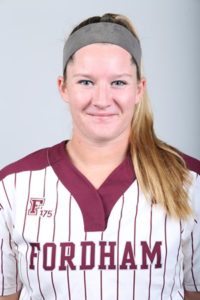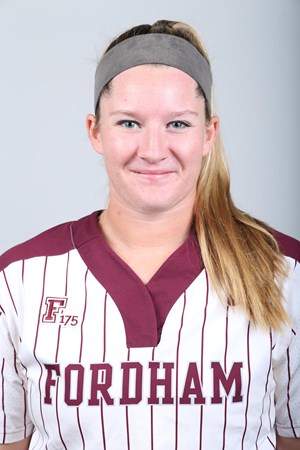By Brendan O’Connell

Fordham Softball hosted the Fordham Tournament this past weekend at the university’s Rose Hill campus, wrapping up the team’s preseason tournament stretch. As the Rams head into Atlantic-10 conference play, they will rely heavily on such leaders like Madison Shaw, a senior infielder from Raynham, Massachusetts. Last season, Shaw set the program single-season record for runs batted in (74), and she currently ranks in the top 10 all-time in career batting average (fourth, at .347), home runs (ninth, with 28), on-base percentage (third, at .439) and slugging percentage (second, at .624).
The Fordham Ram: Let’s take it back to the beginning. How did you get into softball?
Madi Shaw: I started playing softball when I was eight years old. My mom loved to play in high school, and she was the first one to teach me how to swing a bat and throw a ball. My funniest memory from youth softball was my first year playing softball, when my dad put me in to pitch. I walked four batters in a row, and I felt so terribly for letting a run score that I started bawling my eyes out. That was the beginning and ending of my pitching career.
TFR: As you approached your college years, you experienced incredible success in high school, as an All-American and state champion, among other accomplishments. What was your recruiting experience like and what made you choose Fordham?
MS: My junior fall was a whirlwind in regards to recruitment. I had just finished my fall season with a new travel team. I remember being in Orlando and hitting a home run on one of the main fields, and that’s when I got approached by Fordham and about four other schools. Fordham’s campus and their tough, competitive schedule were the two main reasons I chose Fordham. I ended up verbally committing to Fordham in December of my junior year.
TFR: What is one of your best memories from early in your Fordham career?
MS: One of my favorite memories comes from our first spring game in 2015 against Nevada. It was my first collegiate start, and in my first at bat I hit a single that scored two runs. We lost that game, but I’ll never forget the joy of getting my first official hit.
TFR: You had a really solid freshman campaign in 2015, but you played a smaller role than you did in your last couple years of high school, partially due to injury. What was that high-school-to-college transition like for you?
MS: Coming to college was certainly an eye opener in regards to the speed of the game. The competition is increased and the players are much faster and smarter than some that you face in high school.
TFR: What were your injury issues that year and what did you learn from dealing with them?
MS: My first injury freshman year was a bad hamstring strain that happened in our third game of the season. That strain set me back a little over a month. I played sporadically after that in a few games, but then I got injured again at the end of March against Northwestern. This time, I was playing first base and had a collision with a runner. She sliced my ankle open which resulted in a deep cut that required eight stitches, putting me back a week and a half. After that, I never really saw the field again my freshman season. That was a really hard time for me, having to adjust to helping the team from the bench instead of on the field, but I learned just how important every person’s role is to a team’s success.
TFR: Your role has seemingly increased each year, to the point where last season, you set the program record with 74 RBIs, among several other staggering statistics. How have you been able to succeed year after year?
MS: Honestly, I wouldn’t have most of my accolades – especially the RBI statistic – if it weren’t for my teammates doing their job by getting on base. If my teammates weren’t on base my hits wouldn’t mean as much, because they wouldn’t be scoring as many runs. Every year, I’ve just asked myself “what can you do to help the team win?” and for me, what I can do is hit the ball far so that my teammates have enough time to score.
TFR: How do you sustain such a high level of success and continue to hit so consistently? What is your approach at the plate?
MS: It takes a lot of mental preparedness more so than the physical stuff. Personally, I go up to the plate and think “I am better than you” – “you” being the pitcher. Of course, when we play teams such as UCLA and Alabama you have to respect their talents, but I don’t go up to the plate scared. I try to go up confident every single at bat.
TFR: You hit for great power and great average, but you’re also a versatile fielder as you have played a number of positions in both the infield and outfield over the years. What is your favorite position and how do you approach each play?
MS: I would say my favorite position is third base, but currently I am playing more at shortstop. I love the speed of third base, how fielding the ball is more of a reaction. At shortstop you have more time to approach the ball, and that’s certainly been an adjustment for me. Each play, I’m telling myself where I could go to get an out depending on where the ball is hit.
TFR: As a team co-captain this season, what has been your role?
MS: I am a pretty vocal leader so my role has been to make sure everyone is still talking and cheering even when we’re losing a game. I’ve always been a loud kid on the field, so it hasn’t drastically changed my approach to this season.
TFR: According to the softball website you are a Communications major. What drew you to follow this path?
MS: I first entered Fordham as a Biology major, but I struggled with the work load and realized that I didn’t love biology as much as I originally thought. My advisor set me up in a Communications class for my spring semester, and I knew I found what I wanted to learn about for my collegiate career. I have also added on a Marketing minor.
TFR: Besides softball, what are your other interests?
MS: Like any other college kid, I love Netflix and napping. I’m constantly binge watching my favorite shows, such as “The Office,” “Parks and Rec” and “New Girl.”
TFR: You have experienced a lot of success with this coaching regime. How has [head] coach [Bridget] Orchard helped you on and off the field?
MS: Coach Orchard has taught me how to roll with the punches, and that in softball – and life – we have to be able to control what we can control.
TFR: Let’s turn toward the future. What is in store for you? Do you have any post-Fordham plans lined up?
MS: I will be going back home to Massachusetts. I got accepted into Bentley University’s Emerging Leaders’ MBA program, and I will be a graduate assistant coach for the school’s softball team.
TFR: What life lessons has softball taught you?
MS: Don’t be afraid to fail because failure is inevitable. The most important thing is that you learn from your mistakes, and make the proper adjustments for the future.
TFR: What about your Fordham experience are you most grateful for?
MS: I am most grateful for the people I have met during my four years here at Fordham, from my teammates, to the training staff, and the sports information staff. I’ve made friends that will last a lifetime.





































































































































































































